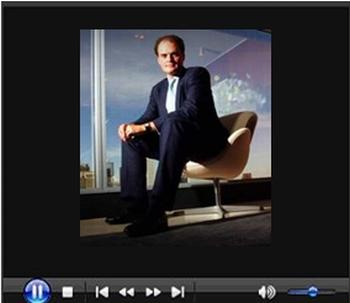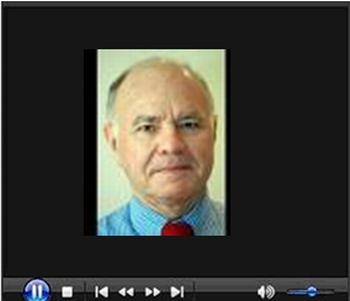Inflate or Die Economic Policy to Drive Gold and Commodities Higher
Economics / Global Economy Nov 30, 2008 - 09:15 PM GMT

 Richard Russell (Dow Theory Letters): “Inflate or die, which one will it be?”
Richard Russell (Dow Theory Letters): “Inflate or die, which one will it be?”
“Suddenly, the whole investment world believes in deflation. The TIPS (inflation adjusted government bonds) have collapsed, commodities have crashed, gold goes nowhere, bonds remain near their highs, the dollar remains strong.
“Meanwhile, Bernanke and Paulson are battling the forces of deflation with all the ammunition at their command. I believe Fed chief Bernanke will fight deflation with the last dollar available at the Fed. Paulson will give the US Treasury away before he gives in to deflation and economic contraction.
“How will we know whether Bernanke-Paulson are winning their desperate anti-deflation battle? If they are winning, the dollar and bonds will head down and gold will head higher. If they are losing the battle, the Dow will break below 7,470 and the bear market will continue to eat away at US stocks and the US economy.
“What we are witnessing now is the single greatest economic battle of the century. ‘Inflate or die', which one will it be?
“Remember, Bernanke's worst nightmare is dealing with out-of-control deflation. The Fed can halt inflation by pushing up interest rates, but in the case of deflation, the Fed can be helpless. And I ask myself, what happens if Bernanke finds that he is losing the battle against deflation? In that case, we are all survivors. I've been there before - during the 1930s. I survived then, and I'll survive now, and so will my subscribers.
“If Bernanke and Paulson are winning the anti-deflation battle, I believe the first ‘signal' would be rising gold. So far, it appears to me that gold is undecided. Gold corrected down to the 717 area, then rallied above 800, and now appears to be in the process of testing the 800 level. It would be a plus for gold if December gold can hold above 800. Gold has never been a more important barometer for the future.”
Source: Richard Russell, Dow Theory Letters , November 26, 2008.
Asha Bangalore (Northern Trust): Q3 GDP preliminary estimate
“Real gross domestic product declined at an annual average rate of 0.5% in the third quarter of 2008, slightly weaker than the advance estimate of a 0.3% drop. Going forward, real GDP is expected to show a decline that is upward of 4.0% in the fourth quarter of 2008. The Fed is widely expected to lower the Federal funds rate to 0.50% on December 16, 2008.”
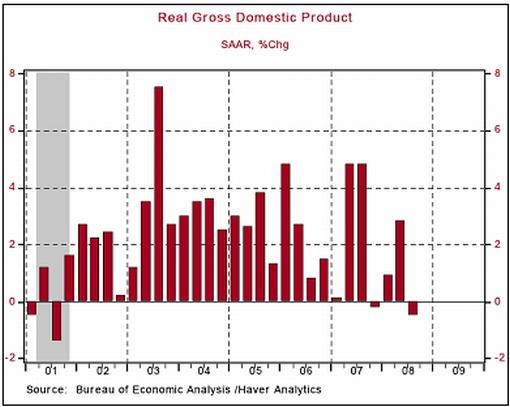
Source: Asha Bangalore, Northern Trust - Daily Global Commentary , November 25, 2008.
Barry Ritholtz (The Big Picture): ECRI leading indicators fall to lowest level ever
“One of the questions I seem to be getting all the time is ‘when is this recession going to end?' To answer that, I turned to Lakshman Achuthan of the Economic Cycle Research Institute (ECRI). Their leading versus coincident chart provides insight into that question.
“The cyclical turns in the leading occur before the coincident - they seem to diverge now and then, and that can be telling. The current story they tell is clearly one of a quickly worsening recession with no end in sight.”
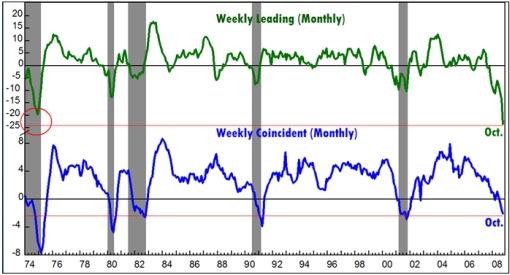
Source: Barry Ritholtz, The Big Picture , November 26, 2008.
Wachovia: US economy in recession mode
“Economic problems began to show up in our model in the fourth quarter of last year as the recession probability rose sharply to 75%, and since then the probability has remained high. While the official recession call will come from the National Bureau of Economic Research sometime next year, for decision-makers the operational guideline is a recession outlook today.”
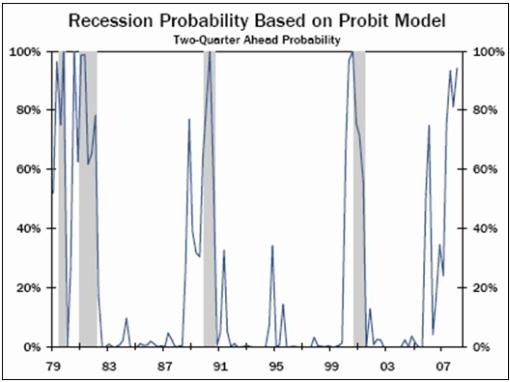
Source: Wachovia , November 24, 2008.
Asha Bangalore (Northern Trust): Durable goods orders show widespread weakness
“The 6.2% drop in orders of durable goods reflects widespread weakness in bookings of durable factory goods.”
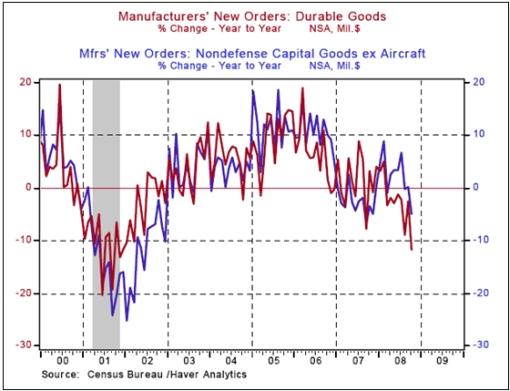
Source: Asha Bangalore, Northern Trust - Daily Global Commentary , November 26, 2008.
Breitbart: First-ever decline in online retail spending
“Online retail spending fell four percent in the first weeks of November from the same period last year, the first ever such decline in e-commerce spending, online researcher comScore reported on Tuesday.
“The Reston, Virginia-based company said 8.2 billion dollars was spent online during the first 23 days of November, four percent less than during the same period last year, when 8.5 billion dollars was spent online.
“ComScore forecast that online retail spending for the November-December holiday period will be flat versus year ago, significantly lower than last year's growth rate of 19 percent.
“‘With consumer confidence low and disposable income tight, the first weeks of November have been very disappointing, with online retail spending declining versus year ago,' said comScore chairman Gian Fulgoni.”
Source: Breitbart , November 25, 2008.
Asha Bangalore (Northern Trust): Weakness in consumer spending most likely to persist
“Nominal consumer spending fell 1.0% in October, while inflation adjusted consumer spending dropped 0.5%. Inflation adjusted consumer spending has declined for five straight months, the longest string of declines since the 1981-82 recession. Based on October data and conservative assumptions about November and December, consumer spending is most likely to post a 4.0% drop in the fourth quarter after a 3.7% decline in the third quarter.
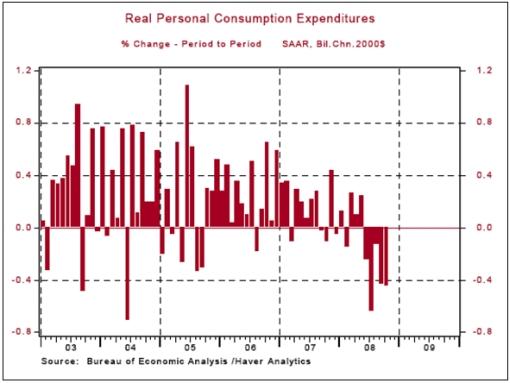
“The 0.3% increase in personal income during October follows a 0.1% gain in September that was affected by hurricanes. Personal saving as a percent of disposable income was 2.4% in October compared with 1.0% in September. A small upward drift in personal saving is emerging.”
Source: Asha Bangalore, Northern Trust - Daily Global Commentary , November 26, 2008.
Standard & Poor's: S&P/Case-Shiller - national trend of home price declines continues
“Data through September 2008, released today by Standard & Poor's for its S&P/Case-Shiller Home Price Indices, shows continued broad based declines in the prices of existing single family homes across the United States, a trend that prevailed since 2007.
“The decline in the S&P/Case-Shiller US National Home Price remained in double digits, posting a record 16.6% decline in the third quarter of 2008 versus the third quarter of 2007. This has increased from the annual declines of 15.1% and 14.0%, reported for the 2nd and 1st quarters of the year, respectively.
“‘The turmoil in the financial markets is placing further downward pressure on a housing market already weakened by its own fundamentals,' says David Blitzer, Chairman of the Index Committee at Standard & Poor's.”
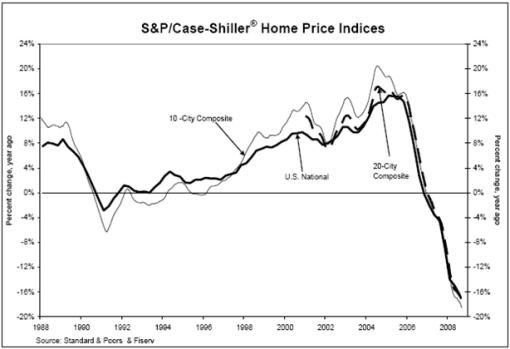
Source: Standard & Poor's , November 25, 2008.
The Wall Street Journal: US agrees to rescue struggling Citigroup
“The federal government agreed Sunday night to rescue Citigroup by helping to absorb potentially hundreds of billions of dollars in losses on toxic assets on its balance sheet and injecting fresh capital into the troubled financial giant.
“The agreement marks a new phase in government efforts to stabilize US banks and securities firms. After injecting nearly $300 billion of capital into financial institutions, federal officials now appear to be willing to help shoulder bad assets, on a targeted basis, from specific institutions.
“Citigroup is one of the world's best-known banking brands, with more than 200 million customer accounts in 106 countries. Its plunging stock price threatened to spook customers and imperil the bank.
“If the government's rescue plan is a success, it could help bring stability to the entire financial system. If it doesn't, even deeper doubts about the industry's future could spread.
“Under the plan, Citigroup and the government have identified a pool of about $306 billion in troubled assets. Citigroup will absorb the first $29 billion in losses in that portfolio. After that, three government agencies - the Treasury Department, the Federal Reserve and the Federal Deposit Insurance Corp. - will take on any additional losses, though Citigroup could have to share a small portion of additional losses.
“The plan would essentially put the government in the position of insuring a slice of Citigroup's balance sheet. That means taxpayers will be on the hook if Citigroup's massive portfolios of mortgage, credit cards, commercial real-estate and big corporate loans continue to sour.
“In exchange for that protection, Citigroup will give the government warrants to buy shares in the company.
“In addition, the Treasury Department also will inject $20 billion of fresh capital into Citigroup. That comes on top of the $25 billion infusion that Citigroup recently received as part of the broader US banking-industry bailout.”
Source: David Enrich, Carrick Mollenkamp, Matthias Rieker, Damian Paletta and Jon Hilsenrath, The Wall Street Journal , November 24, 2008.
Paul Kedrosky (Infectious Greed): Citigroup - bad bank to create bad bank incubator
“I know it isn't precisely what this headline means - ‘bad bank' is a euphemism in bailout circles for walling off from one another functional and non-functional parts of banks - but I still like this from the WSJ today.
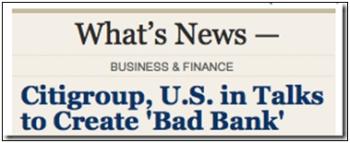
“To my way of thinking, if we're interested in creating bad banks, it's worth knowing that Citi is a veritable ‘bad bank' incubator.”
Source: Paul Kedrosky, Infectious Greed , November 23, 2008.
CNBC: Mobuis - attraction of Treasurys will wane with lower yields
“Despite continued woes in the US economy, the greenback has seen an unexpected surge against currencies around the world. As investors become ever more risk averse, emerging markets are bearing the brunt of a flight to safety.
“But Mark Mobius, executive chairman of Templeton Asset Management, sees a reversal around the corner.
“‘As everyone is rushing into US Treasurys, they need US dollars to do that and have therefore sold everything in sight,' Mobius told CNBC. ‘This is why emerging markets have gone down, why commodities have gone down as everyone is moving into dollars.'
“But Mobius said that ‘as US Treasury rates go down to 1% or below you will see the attraction of US Treasurys waning'.
“Mobius also believes that emerging markets have learnt a bitter lesson since the Asian Crisis of 1997-1998. ‘One big lesson was ‘don't borrow in a currency you are not earning in',' he said.
“Emerging markets have also curtailed lending and built up foreign reserves, which they can call upon in almost ‘a reversal of 1997 where the emerging markets were debtors, they are now the creditors', he added.
“But the surge in the greenback has taken a lot of investors by surprise, Mobius said.
“Having learned from the Asian crisis, companies hedged currencies and ‘ironically these hedges have really worked against them in some cases … as they are over-hedged and it went against them as they were expecting the dollar to go weaker and it went the other way,' he said.”
Source: CNBC , November 20, 2008.
Bespoke: GSE mortgage spreads tighten
“The Fed's actions this morning [Tuesday] have certainly helped to thaw the credit markets so far. As shown below, spreads between 10-year Fannie Mae bonds and the 10-year US Treasury tightened significantly today. While they are certainly moving in the right direction, even after today's record decline, spreads are still higher today than they were just a little more than two weeks ago.”
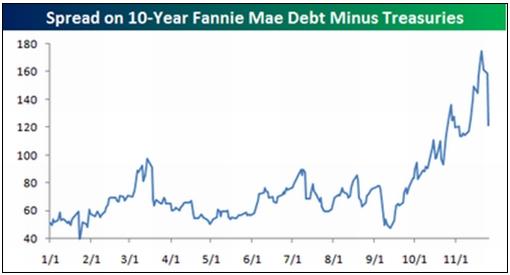
Source: Bespoke , November 25, 2008.
Bespoke: 30-Year fixed mortgage rates falling back
“Talk of the 30-year fixed mortgage rate falling back below 6% filled the airwaves yesterday [Tuesday], so below we provide a two-year chart of the rate. Even as the Fed funds rate has fallen from 5.5% to 1%, mortgage rates have failed to decline along with it, which hasn't done much to help the struggling housing market. Economists and investors are hoping that the Fed's actions yesterday will start pushing mortgage rates lower. This will help ease the credit crisis as banks will become more willing to lend, providing better interest rates for potential homebuyers. 5.81% is better than the 6.4% seen at the start of the month, but the rate could still stand to drop quite a bit.”
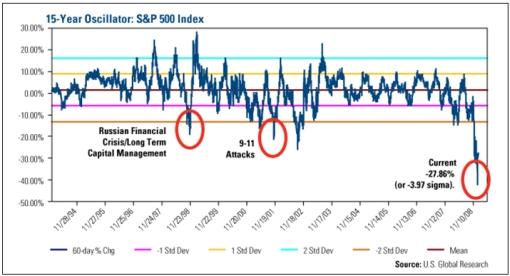
Source: Bespoke , November 26, 2008.
Frank Holmes (US Global Investors): Stock market reversal is near
“According to research from Thomas Weisel, the S&P 500 has been a ‘Buy' since that index closed at 800 last Friday, based on its probability models. They say a verification could come in early December, when monthly liquidity figures come out - if there is extreme positive liquidity to accompany the technical ‘Buy' signal, history shows that on average there's a six-month price rally of 18.5%.
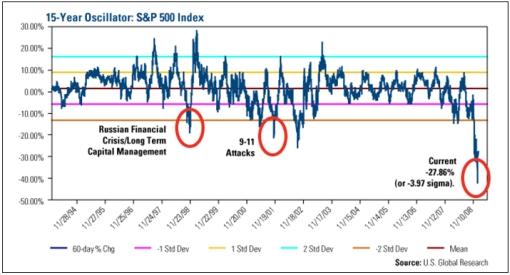
“Our oscillator tells us that, statistically speaking, the S&P 500 is extremely oversold and thus due for a reversal toward the mean. The chart above shows that the S&P 500 is now down about four standard deviations over 60 trading days, which is a far more dramatic decline than we saw in 1998, when Russia endured a currency crisis and the collapse of the hedge fund Long-Term Capital Management threatened the global financial sector, and in 2001 after the September 11 terror attacks.
“The possible turnaround that we are seeing is not wishful thinking, but it's not a sure thing, either. Our confidence grows with every positive data point indicating that a reversal is near, and we will continue watching for these indicators …”
Source: Frank Holmes, US Global Investors - Weekly Investor Alert , November 28, 2008.
Eoin Treacy (Fullermoney): Start thinking about stocks to buy
“Angst, fear and anxiety are all related emotions which come to the fore when we feel under pressure and begin to doubt our abilities as investors. However, when we see a market fall such as that of the last few months, we have to rein in the temptation to succumb to such emotions. It will prove more profitable over the medium to longer-term, to turn objective about the opportunities we are being presented with sooner rather than later.
“This does not mean one piles into the market with every spare unit of currency right now, but it is a time to begin to think about the shares one wants to own in a recovery environment. From a value perspective there are a number of instruments which have been hit particularly hard and somewhat unjustifiably by the credit / solvency crisis.
“We now need to begin to think more about recovery potential rather than further potential losses. Stocks and corporate bonds are no longer expensive, some are downright cheap. We have not reached the deep value levels seen in the past, but these need not necessarily appear at the numerical low for the market, if they appear at all. However, one looks at the market, given the extent of the fall, this is not a time to become increasingly bearish, but is one in which to make provisions and possible purchases for a recovery scenario.”
Source: Eoin Treacy, Fullermoney , November 27, 2008.
David Fuller (Fullermoney): Watch developments in US rather than invest there
“I believe that America's problems of debt and deficits are worse than for many other countries. More importantly, I will be guided by price charts, which reflect the collective decisions and views of everyone else. In terms of investment appropriateness, my current view is that I would rather watch developments in the US than invest there.
“The credit / solvency crisis is clearly America's biggest problem at this time. This is not necessarily true for all other countries, although all are obviously affected to a greater or lesser degree by developments in the USA. I suggest that the West's credit / solvency crisis was only the second biggest problem for Asia's developing economies.
“Asia's biggest recent problem, I maintain, was inflation, not least from previously soaring energy and food prices. That crisis, which in comparison was the USA's second biggest problem, has largely disappeared today. I suspect commodity inflation will not re-emerge for at least the next year or two, subject to supply, global GDP and the USD.
“Consequently, I believe that developing Asia would be in an excellent position for recovery, were it not for the West's ongoing credit / solvency crisis. Therefore, the worse the USA's problems become, the more this will be a drag on Asia's own recovery. Conversely, if the USA somehow avoids a destructive deflation, Asia should still bounce back more quickly.
“I will invest accordingly.”
Source: David Fuller, Fullermoney , November 26, 2008.
Jeffrey Saut (Raymond James): Geithner gotcha
“We still think October 10 represented the capitulation ‘lows'. As Barron's notes, ‘For a bullish spin, though a weak one, the market has not made a significantly lower low since October 10. The word 'significantly' is important because some major market indexes, including the Nasdaq, have indeed been setting new lows. But the trend, if we can call it that, has been more sideways than decidedly down.
“A better, but still weak, bullish angle comes from trading volume, or the amount of money committed to either the bull or bear side each day. All of the higher volume days that have occurred since October 10 have come on days when prices rose. Theoretically, when prices are going up and volume increases, it means that investors are chasing the market higher. That's a sure sign of demand. Subsequent declines occurred with lower volume, so we can conclude that the desire to sell was not quite as strong as it was before October 10.”
Source: Jeffrey Saut, Raymond James , November 24, 2008.
Bespoke: Analysts at their least bullish levels ever
“While Wall Street analysts are typically known for being overly optimistic, based on at least one measure, they have never been less bullish. According to Bloomberg statistics that track analyst buy, sell, and hold ratings, only 36% of all ratings are currently buys. As the chart below shows, this is the lowest level since at least 1997, and significantly lower than the 75% level we saw in 1997 and 2000. However, since the Spitzer crackdown on Wall Street research and the bursting of the tech bubble, analysts have grown increasingly shy about putting a buy rating on a stock they cover.”
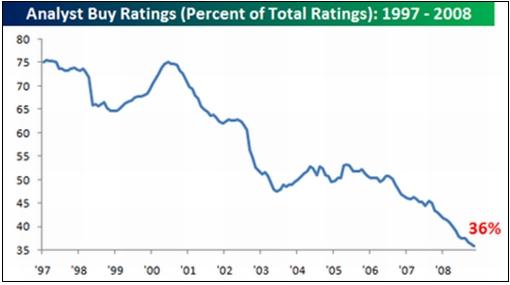
Source: Bespoke , November 25, 2008.
Bespoke: Q3 and Q4 sector earnings growth
“With about 96% of S&P 500 companies having reported third quarter earnings, current EPS growth numbers for the quarter should be very close to what the final tally will read. As shown below, four sectors have had negative year over year growth in the third quarter, while six have had positive growth. Financials and consumer discretionary were once again the sectors that brought down the index as a whole. Financials have seen earnings decline by 129.7% in Q3 ‘08 versus Q3 ‘07. Consumer discretionary has seen earnings decline by 41.4%. Telecom and utilities are the two other sectors with negative Q3 earnings growth, and the S&P 500 as a whole currently stands at -18.4%. The energy sector has had by far the largest earnings growth at 57.4% versus the third quarter of 2007. Consumer staples ranks second behind energy at 10.9%, followed by health care, materials, technology, and industrials.
“So what does the fourth quarter look like? Analysts are expecting the S&P 500 to actually show positive year over year earnings growth in the fourth quarter of 4%. This is because the financial sector is expected to show growth of 64.2% due to the fact that Q4 ‘07 was so bad. Utilities, health care, and consumer staples are the other three sectors expected to see earnings growth, while consumer discretionary, materials, energy, telecom, technology and industrials are expected to see earnings declines.”
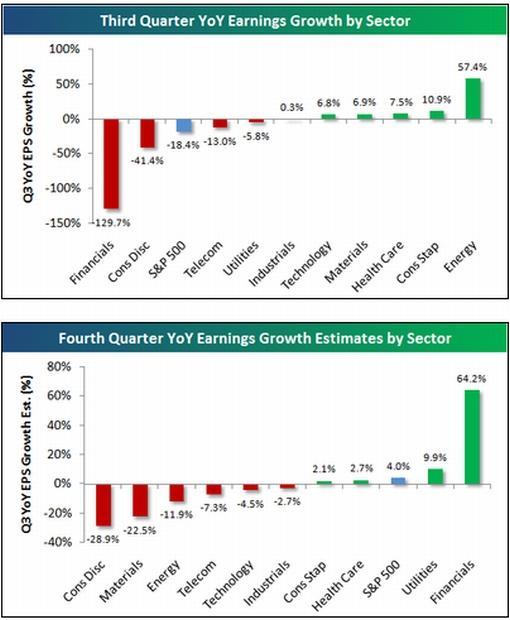
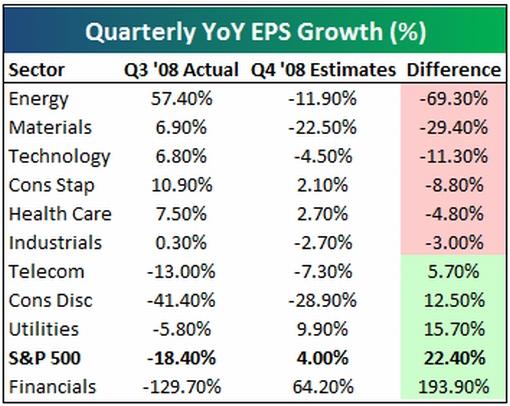
Source: Bespoke , November 23, 2008.
Naked Capitalism: Cheery chart - no corporate profits for two years during depression
“In case you are starting to look to past crises for clues as to how our financial mess might play out, here is a Great Depression factoid (from Levy Forecast, November 2008):
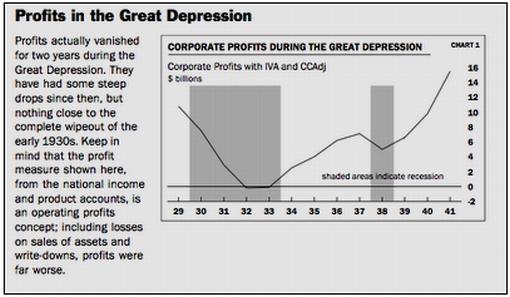
“Note that the report itself argues that the US will have a ‘contained' depression, with deep recession conditions for a protracted period and an anemic recovery. It does not believe the zero operating profits pattern of the Great Depression will be repeated.”
Source: Naked Capitalism , November 23, 2008.
Bloomberg: Hambro sees “great entry points” for commodity stocks
“Evy Hambro, who manages the world's largest mining and gold funds at BlackRock, talks with Bloomberg about the outlook for commodities and mining stocks.”
Source: Bloomberg , November 21, 2008.
Bloomberg: Marc Faber says gold is most precious asset
Source: Bloomberg , November 25, 2008.
Ambrose Evans-Pritchard (Telegraph): Citigroup says gold could rise above $2,000 next year
“The bank said the damage caused by the financial excesses of the last quarter century was forcing the world's authorities to take steps that had never been tried before.
“This gamble was likely to end in one of two extreme ways: with either a resurgence of inflation; or a downward spiral into depression, civil disorder, and possibly wars. Both outcomes will cause a rush for gold.
“‘They are throwing the kitchen sink at this,' said Tom Fitzpatrick, the bank's chief technical strategist.
“‘The world is not going back to normal after the magnitude of what they have done. When the dust settles this will either work, and the money they have pushed into the system will feed though into an inflation shock.
“‘Or it will not work because too much damage has already been done, and we will see continued financial deterioration, causing further economic deterioration, with the risk of a feedback loop. We don't think this is the more likely outcome, but as each week and month passes, there is a growing danger of vicious circle as confidence erodes,” he said.
“‘This will lead to political instability. We are already seeing countries on the periphery of Europe under severe stress. Some leaders are now at record levels of unpopularity. There is a risk of domestic unrest, starting with strikes because people are feeling disenfranchised.”
“Gold traders are playing close attention to reports from Beijing that the China is thinking of boosting its gold reserves from 600 tonnes to nearer 4,000 tonnes to diversify away from paper currencies. ‘If true, this is a very material change,' he said.
“Citigroup said the blast-off was likely to occur within two years, and possibly as soon as 2009. Gold was trading yesterday at $812 an ounce. It is well off its all-time peak of $1,030 in February but has held up much better than other commodities over the last few months - reverting to is historical role as a safe-haven store of value and a de facto currency.”
Source: Ambrose Evans-Pritchard, Telegraph , November 27, 2008.
James Turk (GoldMoney): Scenario for gold is bullish
“Gold soared $50 this past Friday. It began the day at $748 and was trading at $800 when the day ended.
“It is rare for gold to achieve such a huge one-day gain. In fact, I checked my records for the past twenty years and found only one other instance when gold climbed $50 or more in a day. Interestingly, the other occurrence was on September 17, 2008, barely two months ago. That rally also took gold back above $800.
“That these two rallies - unique and rare in their magnitude - occurred so near to one another is significant. Is there a message from these two events? Yes, indeed!
“Gold itself is telling us two things. First, there is an enormous short position in gold. Huge rallies occur for a reason, and short covering is always a factor. In order to limit their losses, shorts will bid up the market in a desperate attempt to cover their position. The rule of thumb is straightforward - the bigger the short position, then the bigger the rally.
“Second, and more importantly, these huge rallies are signaling that gold under $800 is too cheap. A higher price is needed to bring supply and demand back into balance.
“There is other, more than ample evidence to support this same conclusion. The demand for physical metal remains strong.
“Friday's trading action adds to the growing body of evidence that the correction in gold that began after making a new record high in March above $1,020 is ending. The low in gold in all likelihood is probably in place. The $700 level has been tested and re-tested, and the huge rallies launched from prices below $800 mean that other attempts to take gold into the $700s will be met with good demand.
“Gold remains in a bull market, and so does silver. National currencies are in a bear market. Get ready for the next leg in the precious metal's ongoing bull market.”
Source: James Turk, GoldMoney , November 24, 2008.
The Australian: Perth Mint suspends orders amid rush to buy bullion
“Fears of the unknown long-term effects from the global financial crisis have sparked a new gold rush.
“With retail and wholesale clients around the world stocking up on the precious metal, the Perth Mint has been forced to suspend orders.
“As the World Gold Council reported that the dollar demand for gold reached a quarterly record of $US32 billion in the third quarter, industry insiders said the race to secure physical gold had reached an intensity that had never been witnessed before.
“Perth Mint sales and marketing director Ron Currie said the unprecedented demand had forced the Mint to cease orders until January, with staff working seven days a week, 24-hour days, over three shifts to meet orders.
“He said Europe was leading the demand, with Russia, Ukraine, Middle East and US all buying - making up 80% of its sales.
“‘We have never seen this before and are working right at capacity. And we are seeing it from clients in the shop buying one ounce, right up to 30,000 ounces from overseas clients,' Mr Currie said.”
Source: Sarah-Jane Tasker, The Australian , November 22, 2008.
Mike Wittner (Société Générale): Oil prices susceptible to further deleveraging
“Unless oil prices melt down again this week, Opec will not cut production at this weekend's informal meeting in Cairo and instead will wait until the cartel's gathering in December to reduce output quotas by 1 million to 1.5 million barrels a day, says Mike Wittner, global head of oil research at Société Générale.
“Mr Wittner says that Opec simply does not have enough information on the effectiveness of the production cuts that it has already made, or sufficient feedback from its customers, to proceed with further reductions in output. ‘We see (a decision to maintain current production quotas) as a 60-40 probability and the outcome of the meeting could easily be affected by price action this week,' says Mr Wittner, who notes that signals from Opec have been mixed so far.
“Mr Wittner says tanker tracking data suggest there has been a ‘very significant cut' in Opec's oil production in November, down 1.2 million barrels a day compared with October.
“But SocGen says fundamentals will be perceived to be weak until the market becomes convinced Opec has cut supplies, given that a tanker requires six weeks to travel from the Persian Gulf to the US. Only then will November's cuts appear in lower crude imports and stocks, which is what the market wants to see.
“‘Oil prices will remain susceptible to further deleveraging (by hedge funds) and caution remains the order of the day,' concludes Mr Wittner.”
Source: Mike Wittner, Société Générale (via Financial Times ), November 25, 2008.
Financial Times: EU's stimulus plan met with doubts
“The European Union's proposal on Wednesday for a €200 billion economic stimulus plan for the bloc was met by immediate doubts on whether member states would back the measures aimed at avoiding a deeper recession.
“The proposal envisages that about €170 billion would be contributed by the bloc's 27 member states through tax and infrastructure plans. The European Commission and the European Investment Bank would provide the remaining €30 billion, partly through the accelerated pay-out of selected spending programmes.
“The package, which is larger than expected, represents about 1.5% of the EU's gross domestic product. It needs to be reviewed by EU finance ministers next week and by government leaders in mid-December.
“Economists and politicians quickly questioned whether all member states would step up as required or whether individual governments' responses would diverge from the Commission's suggested measures.
“Analysts at Capital Economics, the consultants, said: ‘The proposed boost has yet to be agreed by member states and would sadly not do enough to bring European economies out of the gloom for some time anyway.'
“Business Europe, the main business lobby group in Brussels, agreed with the proposals but said a ‘clear commitment from EU member states' was needed to implement stimulus packages of at least 1.2% of GDP.”
Source: Nikki Tait, Financial Times , November 26, 2008.
BBC News: Boost for Spanish and Italian economies
“Spain and Italy have announced plans worth billions of euros to kick-start their economies.
“Italy approved an 80 billion euro emergency package that included tax breaks for poorer families, public works projects and mortgage relief.
“Spain unveiled an 11 billion euro plan aimed at creating 300,000 jobs.
“The announcements are the latest in a series of attempts by EU governments to shore up their economies as the financial crisis bites.
“Italian Prime Minister Silvio Berlusconi called on to Italians to keep on spending. ‘We have helped citizens, the less well off, so that they can continue to consume,' he said. ‘The intensity and duration of the crisis depends on all of us.'
“Spain's Prime Minister, Jose Luis Rodriguez Zapatero, said the money will be mainly invested in infrastructure and public works.
“Spain's unemployment reached 12.8% in October - the highest in the eurozone.”
Source: BBC News , November 28, 2008.
BBC News: German business confidence dives
“Business confidence in Germany fell in November to the lowest level since 1993, according to the key Ifo economic climate index. The index, based on a poll of 7,000 companies, has dropped for six consecutive months, the Munich-based Ifo institute said.
“The index stands now at 85.8, down 4.4 points from October.
“‘The downturn has worsened and will now have an impact on the labour market,' Ifo said in a statement.
“Germany's exports have been hard hit by falling demand worldwide, with some auto makers seeking state help to maintain production.
“On Friday another key indicator, the Markit purchasing managers' index, revealed that business activity in the 15 countries sharing the euro had fallen in November to a ten-year low.”
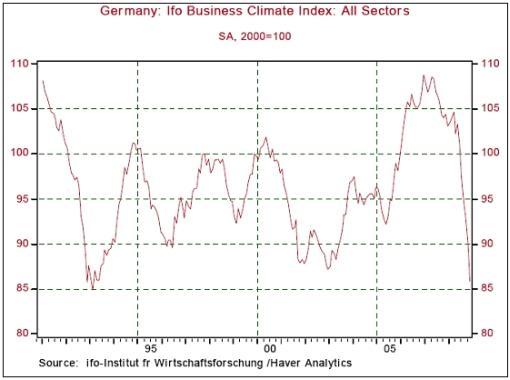
Sources: BBC News , November 24, 2008 and Victoria Marklew, Northern Trust - Daily Global Commentary , November 24, 2008.
Financial Times: Eurozone set for rate cut of at least 50bp
“Eurozone official interest rates are almost certain to be slashed again next week by at least half a percentage point after a survey on Thursday showed the region facing its worst downturn since the recession of the early 1990s.
“Economic confidence in the 15-country region crashed this month to its lowest point since August 1993, the European Commission reported. With inflation also falling rapidly, the European Central Bank has not sought to stop financial markets assuming its main interest rate will be cut next Thursday from 3.25% to 2.75% or below.
“Public ECB comments show the bank remains cautious about the pace of cuts, pointing to a half-point reduction next week - the same as in October and this month. But economic news has been consistently gloomier than expected, strengthening the case for a larger cut.”
Source: Ralph Atkins, Financial Times , November 27, 2008.
Financial Times: UK tax hit to fund £20 billion fiscal stimulus
“Taxpayers face six years of austerity, paying for the consequences of recession and a £20 billion fiscal stimulus unveiled on Monday by Alistair Darling as he detailed the most dismal Budget outlook seen since 1993.
“National insurance contributions for both employees and employers will rise by 0.5%. Those earning more than £100,000 will pay more income tax - with those on £150,000 facing a new higher tax rate of 45% - and public spending faces its biggest squeeze for 15 years - although all these measures will not kick in until 2011, well after the next election. The tax clawback would leave someone earning £150,000 paying an extra £3,040 in tax.
“Mr Darling detailed the planned tax rises and spending restraint as he sought to show the City and foreign investors that Britain had a clear plan to restore prudence to the public finances after truly shocking forecasts for public borrowing in the next two years.
“Public borrowing will hit a record level of £118 billion in 2009-10 and will fall to a level the government considers prudent only in 2015-16, far later than City forecasts had expected.
“Government debt will blast through the current 40% of national income limit, racing to 57% in 2012-13, when it will top the £1,000 billion mark for the first time.
“Britain's output will continue to fall until the second half of next year, the chancellor added, as he presented a gloomy forecast with the recession mitigated only in part by the fiscal boost delivered predominantly through a 2.5 percentage point cut in value added tax from next week and lasting until the end of 2009.
“Over the next year, the cut in the VAT rate to 15% will be augmented by £2.5 billion of additional capital expenditure projects brought forward from 2010-11, a £60 payment to every pensioner, an earlier increase in child benefit and a deferral in the planned increases in vehicle excise duties.
“Mr Darling also used the crisis to stage a series of tactical retreats from earlier decisions, announcing a rethink of his plans to reform air passenger taxes and an exemption from tax for the dividends of UK companies' foreign subsidiaries.
“Together the Treasury assumes the £20 billion package - about 1% of national income for a little over a year - will prevent the economy sinking by a further 0.5%, although Mr Darling's forecast was for a contraction of 0.75% to 1.25% in 2009.”
Source: Chris Giles and George Parker, Financial Times , November 24, 2008.
James Pressler (Northern Trust): China - getting serious about the slowing economy
“The People's Bank of China (PBoC) slashed its benchmark one-year loan and deposit rates by 108 basis points apiece today [Wednesday], reducing them to 5.58% and 2.52%, respectively. This dramatic move comes well after the industrialized economies coordinated a major monetary easing - most central banks have already turned their attention toward liquidity concerns and an eventual global recession. Only three months ago, Beijing had a proactive mindset, thinking about economic stimulus to compensate for the post-Games lull and a general slowdown in global production. The first question that comes to our mind is why does the government suddenly seem to be lagging in its response?
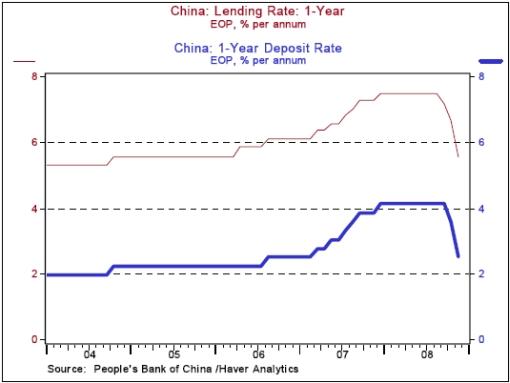
“One fact worth noting is that the immediate economic impact on the Chinese economy has not been as clear-cut as in the industrialized countries. The Olympic Games threw in plenty of distractions and had widespread effects on economic indicators. Retail sales were positively impacted from the many tourists flooding into the country, but conversely, industrial production fell off as many factories closed in response to temporary anti-pollution measures. The conclusion of numerous infrastructure projects shifted flows of goods and inputs, and plenty of other one-off factors added a lot of noise to China's economic statistics. Only after the Games passed and some of those factors fell from the calculations did a clearer picture emerge, and the trends are not promising. Industrial production continues to fall, and monthly export growth is showing signs of weakness.
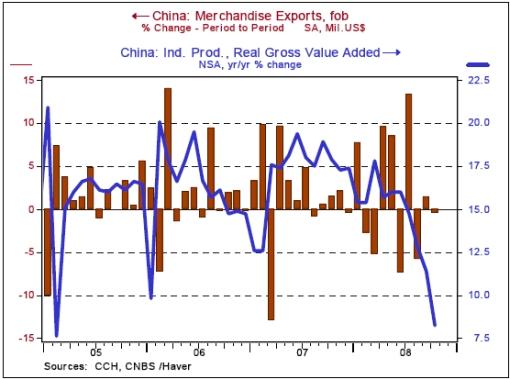
“To be fair, the PBoC issued minor rate cuts over the past three months, and the government did offer a supplementary fiscal stimulus package. Today's more dramatic move suggests that PBoC officials are now firmly convinced that China will be joining the rest of the world in a significant economic slowdown. Some forecasts recently suggested that after GDP growth of nearly 12% in 2007, the economy could slow to below 10% this year and perhaps 7.5% in 2009. While the growth rate itself is still enviable, officials in Beijing realize all too well that a deceleration of over four percentage points will not go unnoticed, and they will likely be taking more action before the year is up.”
Source: James Pressler, Northern Trust - Daily Global Commentary , November 26, 2008.
Bloomberg: China reserves to pass $2 trillion; Russia's fall
“China's foreign-exchange reserves may top $2 trillion for the first time by the end of this year, giving the world's most-populous nation more firepower to stimulate its economy during a global recession.
“China's holdings increased 25% in the first nine months of the year to stand at $1.906 trillion on September 30. Reserves shrank in Japan and Russia, the nations with the second- and third-largest stockpiles. Russia drained a quarter of its currency and gold assets in less than four months to prop up the ruble, which has dropped 14% since June 30.”
Source: Lee J. Miller and Zhang Dingmin, Bloomberg , November 28, 2008.
Breitbart: Analysts - India economy will be OK despite attacks
“The terror attacks that rocked India's financial capital may depress stocks, dampen tourism and slow new investment, but are unlikely to inflict long-term damage on the nation's economy, analysts and business people said Thursday.
“‘This is a challenge for the government to maintain law and order in the country,' said Takahira Ogawa, director of sovereign ratings at Standard & Poor's in Singapore. ‘At this stage, I don't think there will be any major impact on the macroeconomic or fiscal position of the government.'
“The attacks, which began Wednesday night when gunmen invaded two posh hotels, a restaurant and several other sites in downtown Mumbai, came as India was struggling to contain fallout from the global financial crisis.
“Foreign investors have already pulled $13.5 billion out of the nation's stock market this year, driving the benchmark Sensex index down 57% and punishing the rupee. Liquidity has dried up, economic growth is slowing and people are spending less money.
“The attacks are ‘a challenge to the economic resurgence in India', said Habil Khorakiwala, chairman of Wockhardt, an Indian pharmaceutical company.
“‘The targets identified clearly demonstrate that the intention is to create panic and shatter the confidence in the minds of investors in India and global investors coming to India,' he said in a statement. ‘This war has to be fought together by all across, to protect the safety of Indian people, for economic resurgence and growth of the Indian nation.'”
Source: Breitbart , November 27, 2008.
BBC News: Saudi Arabia cuts interest rate
“Saudi Arabia has cut a key interest rate and taken steps to encourage lending as it faces the slowdown. The central bank reduced the repo interest rate from 4% to 3%, in an attempt to boost liquidity. It also reduced the cash reserve requirements for banks, seen as a way to improve the availability of credit.
“The move came a day after the benchmark Tadawul All Share Index fell to its lowest level in five years, hit by the global slowdown and falling oil prices. The index shed 9.2% on Saturday, the start of its trading week. Since the start of the year the index is down more than 60%.
“The Gulf region has been hard hit by a huge fall in oil prices, a key export. Oil prices are around two thirds lower than they were in July when they hit a record above $147 a barrel.”
Source: BBC News , November 23, 2008.
Did you enjoy this post? If so, click here to subscribe to updates to Investment Postcards from Cape Town by e-mail.
By Dr Prieur du Plessis
Dr Prieur du Plessis is an investment professional with 25 years' experience in investment research and portfolio management.
More than 1200 of his articles on investment-related topics have been published in various regular newspaper, journal and Internet columns (including his blog, Investment Postcards from Cape Town : www.investmentpostcards.com ). He has also published a book, Financial Basics: Investment.
Prieur is chairman and principal shareholder of South African-based Plexus Asset Management , which he founded in 1995. The group conducts investment management, investment consulting, private equity and real estate activities in South Africa and other African countries.
Plexus is the South African partner of John Mauldin , Dallas-based author of the popular Thoughts from the Frontline newsletter, and also has an exclusive licensing agreement with California-based Research Affiliates for managing and distributing its enhanced Fundamental Index™ methodology in the Pan-African area.
Prieur is 53 years old and live with his wife, television producer and presenter Isabel Verwey, and two children in Cape Town , South Africa . His leisure activities include long-distance running, traveling, reading and motor-cycling.
Copyright © 2008 by Prieur du Plessis - All rights reserved.
Disclaimer: The above is a matter of opinion and is not intended as investment advice. Information and analysis above are derived from sources and utilizing methods believed reliable, but we cannot accept responsibility for any trading losses you may incur as a result of this analysis. Do your own due diligence.
Prieur du Plessis Archive |
Did you enjoy this post? If so, click here to subscribe to updates to Investment Postcards from Cape Town by e-mail.
By Dr Prieur du Plessis
Dr Prieur du Plessis is an investment professional with 25 years' experience in investment research and portfolio management.
More than 1200 of his articles on investment-related topics have been published in various regular newspaper, journal and Internet columns (including his blog, Investment Postcards from Cape Town : www.investmentpostcards.com ). He has also published a book, Financial Basics: Investment.
Prieur is chairman and principal shareholder of South African-based Plexus Asset Management , which he founded in 1995. The group conducts investment management, investment consulting, private equity and real estate activities in South Africa and other African countries.
Plexus is the South African partner of John Mauldin , Dallas-based author of the popular Thoughts from the Frontline newsletter, and also has an exclusive licensing agreement with California-based Research Affiliates for managing and distributing its enhanced Fundamental Index™ methodology in the Pan-African area.
Prieur is 53 years old and live with his wife, television producer and presenter Isabel Verwey, and two children in Cape Town , South Africa . His leisure activities include long-distance running, traveling, reading and motor-cycling.
Copyright © 2008 by Prieur du Plessis - All rights reserved.
Disclaimer: The above is a matter of opinion and is not intended as investment advice. Information and analysis above are derived from sources and utilizing methods believed reliable, but we cannot accept responsibility for any trading losses you may incur as a result of this analysis. Do your own due diligence.
Prieur du Plessis Archive |
© 2005-2022 http://www.MarketOracle.co.uk - The Market Oracle is a FREE Daily Financial Markets Analysis & Forecasting online publication.



